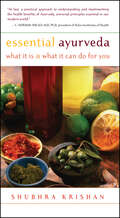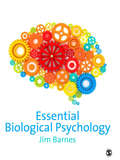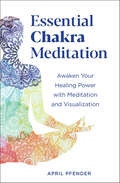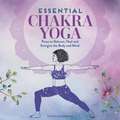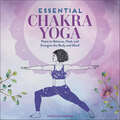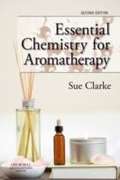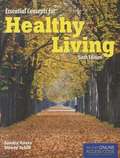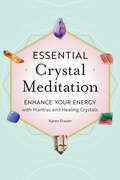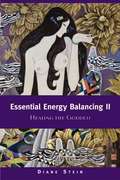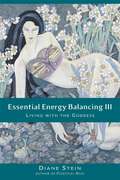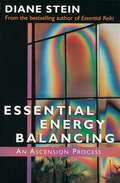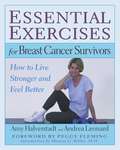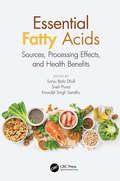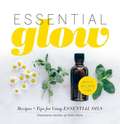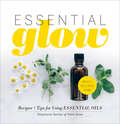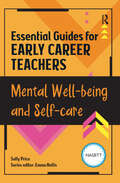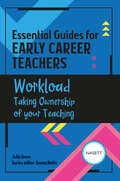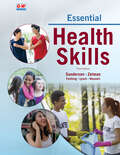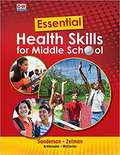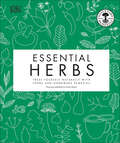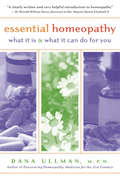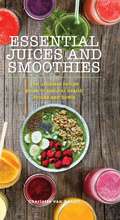- Table View
- List View
Essential Ayurveda: What It Is and What It Can Do for You
by Shubhra KrishanOutlining the basic elements of Ayurveda, Shubhra Krishan teaches readers how to recognize their energy and body type, and to use Ayurvedic principles to create a balanced diet and lifestyle for optimum health. She offers tips and suggestions for finding the best products or for creating your own with her recipes for food, beauty care, and other healthcare items. Based on the ancient system of Ayurveda, this practical guide profiles simple key concepts of good health.
Essential Biological Psychology
by Jim BarnesDrawing on the latest exciting research, Essential Biological Psychology provides students with a solid grasp of the relationship between mind and behaviour, and a detailed understanding of the underlying structure and physiological mechanisms that underpin it. The functions of the nervous system are explained and implications for health are explored. Throughout the book, Jim Barnes encourages students to evaluate essential concepts and theoretical issues. <P><P> Features include:<P> * key concepts highlighted throughout the text enables students to grasp the fundamental knowledge and understanding of the structures and functions of the human nervous system that are relevant to the study of psychology <P> * the snapshot of key studies detailed in the textboxes allow critical evaluation of the role of physiology in human behaviour against a backdrop of up to date research <P> * clear explanations of the key methods in the text give students an appreciation of the contributions made by the different approaches and research methods that are used in biological psychology <P> * memory maps and diagrams within the text encourage learning and allow students to formulate memory aids to assist recall in exam conditions <P> * a companion website found at www.sagepub.co.uk/barnes consists of PowerPoint lecture slides and a testbank for teachers (50 questions per chapter) as well as interactive self-assessment testbank for students (10 questions per chapter)
Essential Chakra Meditation: Awaken Your Healing Power with Meditation and Visualization
by April PfenderUnlock your healing power with chakra meditation.Your chakras are your body's vital energy centers, and their health can impact your physical and mental wellbeing. Drawing on rich traditions and hundreds of years of knowledge, Essential Chakra Meditation shows you that practicing intention and purpose can transform your mind, body, and spirit.Discover how to unblock your energy through a series of guided meditations—each tailored to treat a specific chakra. Whether you're new to meditation or have some experience, this book offers you everything you need to create internal balance and start healing today.Essential Chakra Meditation includes:Awaken your healing power—Learn how guided meditations can keep your energy flowing—reducing stress, easing fatigue, and bringing balance back to your busy life.Understanding your chakras—Detailed descriptions of the Root, Sacral, Solar Plexus, Heart, Throat, Third Eye, and Crown chakras provide you with the information needed to diagnose and treat blockages.Essential mantra and mudras—Enhance your meditation and mind-body healing with mantras (short chants) and mudras (hand postures) for each chakra.Master the art of chakra healing and help free yourself from worry and exhaustion.
Essential Chakra Yoga: Poses To Balance, Heal, And Energize The Body And Mind
by Christina D'ArrigoAchieving physical and mental balance is beautiful and healing. But the journey to harmony can be challenging. Essential Chakra Yoga is an easy way for beginners, trained teachers, and everyone in between, to unblock and align their chakras, find balance, and heal both body and mind--one pose and one pranayama ("controlled breath") at a time. From simple Siddhasana ("accomplished pose") to the more advanced Salamba Sirsasana ("supported headstand"), Essential Chakra Yoga is a masterclass in breathing techniques, stretching, and sequencing various poses that can enhance your quality of life every day while boosting strength and flexibility. Take a deep, cleansing breath. It's time to body-bend your way toward bliss. This complete chakra yoga guide includes: Packed with poses--Master 56 essential chakra yoga positions and 8 stretching sequences for cleansing the 7 major chakras. Perfect for all levels--This educational chakra yoga book is a must-have for beginners and home practices, but it's also ideal for skilled teachers and practitioners too. Modern mat companion--Practice along with clear, color Illustrations that demonstrate each pose and get you on the path to chakra yoga mastery. Bring balance to your mind, body, and spirit with this healing chakra yoga guide.
Essential Chakra Yoga: Poses to Balance, Heal, and Energize the Body and Mind
by Christina D'ArrigoRecover, recharge, renew—your essential yoga guide to balancing chakras.Achieving physical and mental balance is beautiful and healing. But the journey to harmony can be challenging. Essential Chakra Yoga is an easy way for beginners, trained teachers, and everyone in between, to unblock and align their chakras, find balance, and heal both body and mind—one pose and one pranayama ("controlled breath") at a time.From simple Siddhasana ("accomplished pose") to the more advanced Salamba Sirsasana ("supported headstand"), Essential Chakra Yoga is a masterclass in breathing techniques, stretching, and sequencing various poses that can enhance your quality of life every day while boosting strength and flexibility. Take a deep, cleansing breath. It's time to body-bend your way toward bliss.This complete chakra yoga guide includes:Packed with poses—Master 56 essential chakra yoga positions and 8 stretching sequences for cleansing the 7 major chakras.Perfect for all levels—This educational chakra yoga book is a must-have for beginners and home practices, but it's also ideal for skilled teachers and practitioners too.Modern mat companion—Practice along with clear, color Illustrations that demonstrate each pose and get you on the path to chakra yoga mastery.Bring balance to your mind, body, and spirit with this healing chakra yoga guide.
Essential Chemistry for Aromatherapy
by Sue ClarkeThis new edition of Essential Chemistry for Safe Aromatherapy provides an accessible account of the key theoretical aspects of chemistry and their application into the safe practice of aromatherapy. For readers with a limited science background, this book offers a clear and concisely written guide to essential information in chemistry.
Essential Clinical Anesthesia
by Charles A. Vacanti Pankaj Sikka Richard UrmanThe clinical practice of anesthesia has undergone many advances in the past few years, making this the perfect time for a new state-of-the-art anesthesia textbook for practitioners and trainees. The goal of this book is to provide a modern, clinically focused textbook giving rapid access to comprehensive, succinct knowledge from experts in the field. All clinical topics of relevance to anesthesiology are organized into 29 sections consisting of more than 180 chapters. The print version contains 166 chapters that cover all of the essential clinical topics, while an additional 17 chapters on subjects of interest to the more advanced practitioner can be freely accessed at www. cambridge. org/vacanti. Newer techniques such as ultrasound nerve blocks, robotic surgery, and transesophageal echocardiography are included, and numerous illustrations and tables assist the reader in rapidly assimilating key information. This authoritative text is edited by distinguished Harvard Medical School faculty, with contributors from many of the leading academic anesthesiology departments in the United States and an introduction from Dr S. R. Mallampati. This book is your essential companion when preparing for board review and recertification exams and in your daily clinical practice.
Essential Concepts for Healthy Living, Sixth Edition
by Sandra Alters Wendy SchiffThoroughly revised and updated, Essential Concepts for Healthy Living, Sixth Edition provides students with a clear and concise introduction to the latest scientific and medical research in personal health. With its unique focus on critical thinking and analysis of health-related behaviors and attitudes, this text enhances students’ understanding of their own health needs and presents the scientific background necessary for students to think critically about the reliability of health-related information they encounter in the media. New to the Sixth Edition Updated Design - interior layout has been upgraded and modernized Includes Healthy People 2020 and MyPlate New sections added - Transgender, Anti-Drug Vaccines, Alcohol-related injury deaths in college students, Electronic cigarettes, or e-cigarettes, Celiac Disease, Consumer Health: CAM Products and Colds, and more
Essential Crystal Meditation: Enhance Your Energy with Mantras and Healing Crystals
by Karen FrazierDeepen your meditation with the power of crystals Crystals are a natural tool for channeling positive energy through your body and mind—especially while you meditate. But with all the colors, shapes, and properties of crystals out there, where do you begin? If you're seeking to infuse crystals into your meditation practice, this is your must-have guide to unlocking a new level of wellness. What sets this crystal book apart: The essential stones—Find a clear explanation of crystal healing and how it works, with a convenient list of 50 powerful crystals and their key characteristics. Your crystal companions—Learn how to make sure the right crystal finds you, and discover how to enhance its properties to align with your goals and intentions. Elevated meditations—Put your crystals to use as you meditate with amethyst for better sleep, with rhodochrosite to manifest love, or with aquamarine for finding calm. Supercharge your meditation practice with this book of crystals for beginners.
Essential Energy Balancing II: Healing the Goddess
by Diane SteinIn ESSENTIAL ENERGY BALANCING and RELIANCE ON THE LIGHT, best-selling author Diane Stein taught readers how to heal and cleanse their souls of the negative karma suffered on Earth. Now, in ESSENTIAL ENERGY BALANCING II, she explains how to continue the process of releasing the karma through 24 individual processes, including "Connection with the Light" and "Vibrational Sealing." Readers learn to let go of karmic baggage, not just here on Earth, but throughout the Universe, in order to enjoy the full potential of their soul'¬?s energy. Rich with encouragement, ESSENTIAL ENERGY BALANCING II guides readers to an empowering place of healing and growth.From the Trade Paperback edition.
Essential Energy Balancing III: Living with the Goddess
by Diane Stein"To heal oneself means to heal the world." With this starkly simple statement, Diane Stein draws upon the great mystical traditions, including Kundalini yoga, Wicca, Taoism, and more. In the final installment of her ENERGY BALANCING trilogy, she discusses 24 processes for healing individual and collective karma on the cosmic level. The much-anticipated culmination of Diane Stein's definitive three-volume investigation into the realm of multidimensional energetic healing. Illuminates the cosmology explored in the earlier books and provides 24 new applications for readers seeking the most advanced levels of spiritual growth.
Essential Energy Balancing: An Ascension Process
by Diane SteinLet Diane Stein and ESSENTIAL ENERGY BALANCING show you how to be all that you can be. Essential Energy Balancing® is an ascension [enlightenment] process--one of total healing. The karmic suffering we're born with, for the most part, is implacable. Now it can be changed, lovingly, with a simple formula and the blessings of the Lords of Karma--the keepers of our souls' evolution. Part 1 of Essential Energy Balancing® teaches the easy self-healing methods that change suffering into wellness and inner peace. Part II is a series of ten energy reprogramming meditations that lead to ascension and bring out your Goddess-Within. Part III is a discussion of energy anatomy and of who we really are--a highly complex system.
Essential Equations for Anaesthesia
by Edward Gilbert-Kawai Marc WittenbergA sound knowledge of equations and their use, derivation and clinical application is an absolute prerequisite for any anaesthetist. As a result, equations are a favourite question topic of examiners, particularly in the viva examinations. Many candidates answer these poorly, losing valuable marks and floundering when they face what they perceive as "nightmare" questions. This book provides a simple, portable, reference guide to all the equations that candidates may be asked about during their examinations. The content is split into four sections; physics, pharmacology, physiology and statistics. Each equation is clearly explained, derived where necessary, and placed into a clinical context using a worked or clinically relevant example to demonstrate its use. Units and relevant terms are given and where required, clear, concise diagrams have also been provided to simplify understanding. Written by anaesthetic trainees, this is an essential resource for preparation for the FRCA, EDA and other anaesthetic examinations.
Essential Evidence-Based Psychopharmacology
by Stephen M. Stahl Dan J. Stein Bernard LererThis volume presents up-to-date, comprehensive and high quality reviews of the psychopharmacological evidence-base for each of the major psychiatric disorders, written by expert psychopharmacologists from around the world. Building on the success of the first edition, the volume summarizes the wealth of new developments in the field and sets them within the context of day-to-day clinical practice. All chapters have been fully updated and new contributions on personality disorders and substance dependence added. Each chapter provides information about optimal first line pharmacological interventions, maintenance pharmacotherapy and the management of treatment-refractory patients. The content is organized according to the DSM-V listing of psychiatric disorders, and covers all major conditions including schizophrenia, mood disorders, anxiety disorders, eating disorders and Alzheimer's disorder. These issues lie at the heart of clinical psychopharmacology, making this book invaluable to all practising and trainee clinicians, in a mental health setting or a less specialized environment.
Essential Exercises for Breast Cancer Survivors
by Anne HalverstadtThis book offers guidance on how to begin an exercise program after diagnosis and treatment for breast cancer. It is not meant to replace appropriate medical care. The authors have consulted experts in the fields of breast cancer and exercise, reviewed the scientific literature, and used every meanspossible to ensure that the information presented is accurate and up-to-date at the time of publication. It is important to note that new research may alter or invalidate some of the information presented in this book. This book is based on the original EM-POWER (Energizing Mobilizing Postoperative Workout Enhancing Recovery®) program. Although the many benefits of regular exercise are well docu mented, the authors make no guarantees or representations regarding the EM-POWER and Essential Exercises programs and their materials, including but not limited to accuracy, completeness, currency, reliability, merchantability, fitness for a particular purpose, or results that will be achieved from this program. Results are individual and may vary.
Essential Fatty Acids: Sources, Processing Effects, and Health Benefits
by Sanju Bala Dhull, Sneh Punia, Kawaljit Singh SandhuEssential fatty acids are fatty acids that humans must ingest because the body requires them for good health, but it cannot synthesize itself. Therefore, such nutrients need to be supplied from either diet or dietary supplements. Recent studies raised scientific and medical interest in the beneficial effects of these fatty acids on brain and retina function, as well as reducing ill health effects, such as cardio-metabolic diseases. Thus, there is an interest in developing requirements and dietary recommendations. Essential Fatty Acids: Sources, Processing Effects, and Health Benefits provides a systematic introduction and comprehensive information about the essentiality of diets rich in omega fatty acids for successful human growth, development and disease prevention. This book presents detailed knowledge about essential fatty acids, their different food sources, biochemistry, and metabolism. It provides a comprehensive assessment of current knowledge about the effects of various processing and storage conditions on essential fatty acids, their bioavailability and supplementation in foods and diet. Chapters highlight the contribution of essential fatty acids in prevention and improvement of various conditions such as heart problems, arthritis, cancer, brain and bone health, especially in developing fetuses and children. Key Features: Presents comprehensive information on nutritional and health aspects of fats and essential fatty acids Contains a wealth of information on the structure, sources, biochemistry and nutritional properties of essential fatty acids Provides the latest information about the changes in essential fatty acids during various processing and storage conditions Highlights the bioavailability, supplementation and dietary requirements of these fatty acids By bringing together diverse areas of biochemistry, storage, as well as processing behavior and dietary requirements, this book lays the groundwork for striking expansion in our understanding of these important biochemicals and their role in health and disease prevention. Essential Fatty Acids will be of interest to a large and varied audience of researchers in academia, industry, nutrition, dietetics, food science, agriculture, and regulators.
Essential Glow: Recipes & Tips for Using Essential Oils
by Stephanie Gerber<p>Lavender, chamomile, tea tree, rose, and sandalwood—invite the aromatic and healing powers of your favorite herbs and botanicals into your life with this beautiful guide. You’ll discover recipes, quick tips, and DIY projects to boost your beauty, home, and general wellness with your favorite essential oils, plus a diagnostic tool that helps you treat common ailments with the right essential oils. <p>We’ve all heard that essential oils are good for us—the aromas and chemicals in these special distilled herbal treatments can soothe the senses, kick-start a sluggish day, or even help restore health or repair troubled skin. There are a whole host of ways to use them—from decadent massage candles to hardworking laundry softeners, from relieving bug-bite balm to skin-clearing concoctions. Essential Glow is packed with everything the aromatherapy DIY-er needs: 200+ recipes and projects with simple step-by-step instructions, targeted aromatherapy blends, a pantry primer, and much more.</p>
Essential Glow: Recipes & Tips for Using Essential Oils
by Stephanie GerberDiscover how essential oils can boost your beauty, home, and wellness with over 200 easy recipes and projects from the author of Hello Glow. Lavender, chamomile, tea tree, rose, and sandalwood—invite the aromatic and healing powers of your favorite herbs and botanicals into your life with this beautiful guide. You&’ll discover recipes, quick tips, and DIY projects to boost your beauty, home, and general wellness with your favorite essential oils, plus a diagnostic tool that helps you treat common ailments with the right essential oils. We&’ve all heard that essential oils are good for us—the aromas and chemicals in these special distilled herbal treatments can soothe the senses, kick-start a sluggish day, or even help restore health or repair troubled skin. There are a whole host of ways to use them—from decadent massage candles to hardworking laundry softeners, from relieving bug-bite balm to skin-clearing concoctions. Essential Glow is packed with everything the aromatherapy DIY-er needs: 200+ recipes and projects with simple step-by-step instructions, targeted aromatherapy blends, a pantry primer, and much more.Featured essential oils include:Soothe: Lavender, Roman Chamomile, Geranium, Rose, Clary Sage, Jasmine, Ylang Ylang, SandalwoodUplift: Peppermint, Sweet Orange, Cinnamon, Atlas Cedarwood, Lemongrass, Juniper Berry, RosemaryRestore: Oregano, Frankincense, Ginger, Tea Tree, Lemon, Eucalyptus
Essential Guides for Early Career Teachers: Mental Well-being and Self-care (Essential Guides for Early Career Teachers)
by Sally McWilliamThe Essential Guides for Early Career Teachers provide accessible, carefully researched, quick-reads for early career teachers, covering the key topics they will encounter during their training year and first two years of teaching. They complement and are fully in line with the new Early Career Framework and are intended to assist ongoing professional development by bringing together current information and thinking on each area in one convenient place.This title on Mental Well-being and Self-care explores these increasingly significant issues for those training to teach or in the early stages of their teaching career. It draws upon a new body of evidence-based knowledge and an emerging lexicon which fosters and supports mentally healthy routines as teaching practice develops. Critical but also practical, the text guides the reader through research-based concepts and reflective tasks central to positive mental health and well-being, supporting early career teachers as they develop their teaching skills and techniques.
Essential Guides for Early Career Teachers: Taking Ownership of your Teaching (Essential Guides for Early Career Teachers)
by Julie GreerLinked to the Early Career Framework, this book provides practical time management and productivity strategies to help new teachers tackle the issue of workload.Workload is a key issue for most beginning teachers. Trying to cope with all the demands of a new job with an increasing burden of administration, reporting and assessment tasks, can be daunting at best and may even lead to significant mental health issues. But there is a way through it all! This book acknowledges the challenges that exist and suggests evidence-informed ideas that can be used both in and outside the classroom to create an acceptable workload. It takes a positive and proactive stance, encouraging early career teachers to implement strategies that will enable them to work more effectively and ultimately bring a high level of enjoyment and job satisfaction.
Essential Health Skills
by Catherine A. Sanderson Mark Zelman Diane Farthing Melanie Lynch Melissa MunsellEssential Health Skills provides the skills and information students need to make responsible decisions and promote a lifetime of health and wellness. Students will have the opportunity to practice their health skills in a variety of contexts, related to the subjects that most apply to their lives. Content and skills align to the National Health Education Standards. By studying this text, students will be empowered to advocate for every area of their health, now and in the future.
Essential Health Skills for Middle School
by Catherine A. Sanderson Mark Zelman Lindsay Armbruster Mary McCarleyNIMAC-sourced textbook
Essential Herbs: Treat Yourself Naturally with Herbs and Homemade Remedies
by Neal's Yard RemediesFind your route to natural wellness with Neal's Yard Remedies' expert guide to using medicinal herbs.Essential Herbs offers expert advice and know-how you can trust in this detailed guide, which features an illustrated directory of 100 key herbs, including hemp, lavender, thyme, aloe vera, and lemongrass. Discover the treatment potential for each plant, and how you can prepare and use them to best effect.Alongside the directory, the book features more than 70 recipes designed to heal the body from the inside out, all of which can be prepared in your own kitchen. Try a fennel and chamomile tea to aid digestion, a cranberry and apricot power bar to boost energy levels, or a beeswax and calendula balm to combat stretch marks.With this easy-to-use treatment guides to help you find the herbs you need at a glance, Essential Herbs is a comprehensive guide to staying healthy the natural way.
Essential Homeopathy
by Dana UllmanHomeopathy, based on the simple principle of stimulating the body's own healing response, is more popular than ever. This book answers frequently asked questions, introducing readers to the practice and explaining which conditions respond best to homeopathic treatment. Homeopathy offers safe alternatives to more intrusive medical practices for treating digestive troubles, colds, flus, allergies, and headaches.
Essential Juices and Smoothies (Essentials)
by Charlotte van AusselJuice your way to better health with more than 1,000 easy recipes.Essential Juices and Smoothies contains more than a thousand easy recipes for juices, smoothies, and breakfast bowls, including well-known favorites as well as more exotic—but no less delicious—creations. Understand the nutritional benefits of veggie and fruit ingredients, and find recipes that target specific goals, such as cleansing and detoxifying. Whether you’re looking for a breakfast smoothie, an afternoon snack, or a healthy dessert, Essential Juices and Smoothies is your guide to creating delicious blends.
